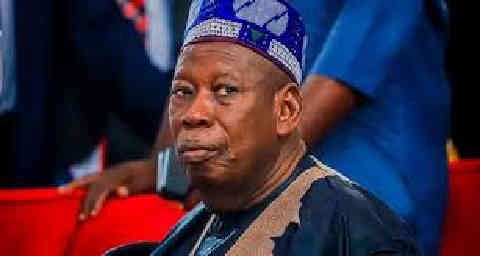How APC National Chairman Ganduje Was Forced to Resign: Inside the Power Struggle Ahead of 2027
- Advertisement -
Resignation Amid Political Power Plays Ahead of 2027
In a move that has stunned party insiders and political observers alike, Dr. Abdullahi Umar Ganduje, the National Chairman of the All Progressives Congress (APC), has resigned from his position, citing health reasons. However, multiple credible sources have confirmed to TJ News Nigeria that Ganduje’s resignation was not entirely voluntary. Instead, it was the result of strategic political calculations, particularly concerning the 2027 presidential elections.
- Advertisement -
TJ News Nigeria learnt that Ganduje was compelled to submit his resignation letter after a midnight visit by the head of one of Nigeria’s top security agencies, who personally delivered a message demanding the resignation.
“We are all shocked. We didn’t see it coming,” said a source close to the former APC chairman.
Hours before the resignation became public, Ganduje was still performing his duties, leading a condolence delegation to the Niger State Governor over recent flooding and banditry. This is believed to have been his last official assignment as APC chairman.
- Advertisement -
The Kwankwaso Factor: Political Reconciliation or Strategic Ouster?
Sources close to the Presidency linked Ganduje’s resignation to efforts aimed at luring Senator Rabiu Musa Kwankwaso, leader of the Kwankwasiyya Movement, back to the APC. It was learnt that President Bola Tinubu had long courted Kwankwaso and viewed his return as essential for consolidating power in Kano and across the North.
One of the key conditions allegedly set by Kwankwaso for rejoining the APC was Ganduje’s removal.
- Advertisement -
“Kwankwaso gave the president one condition for rejoining the APC: Ganduje’s removal as national chairman. With Ganduje in charge, Kwankwaso couldn’t assume party leadership in Kano,” a reliable source disclosed.
With reports that Kwankwaso had begun considering overtures from the opposition coalition led by former Vice President Atiku Abubakar, Tinubu’s camp allegedly moved swiftly to eliminate obstacles to Kwankwaso’s return.
North Central Stakeholders Mount Pressure
In addition to the Kwankwaso angle, Ganduje’s tenure faced mounting opposition from APC stakeholders in the North Central zone. Ganduje, from Kano State in the North West, succeeded Senator Abdullahi Adamu from Nasarawa State in the North Central, who was forced to resign in 2023 after clashing with Tinubu’s camp during the APC primaries.
Since Ganduje’s emergence, North Central party leaders have consistently demanded that the position of national chairman return to their zone.
- Advertisement -
Leading North Central Replacements:
- Senator Umaru Tanko Al-Makura (former Governor of Nasarawa)
- Senator George Akume (current SGF and former Governor of Benue)
- Senator Mohammed Sani Musa (“313”) (Chairman, Senate Committee on Finance)
Each is seen as loyal to President Tinubu, but their prospects are complicated by the current APC governors in their home states, who traditionally control party structures.
Ganduje’s Final Days and Party Transition Plans
Following Ganduje’s forced exit, Hon. Abubakar Kyari Dalori, the APC’s Deputy National Chairman (North), is expected to take over in acting capacity. The party constitution stipulates that the deputy from the same region as the chairman will assume office temporarily.
APC National Director of Publicity, Bala Ibrahim, told reporters that he had not been officially informed of Ganduje’s resignation. However, he confirmed that party regulations provide for Dalori to assume acting leadership.
TJ News Nigeria gathered that an emergency National Executive Committee (NEC) meeting is being planned to formalise the leadership transition and possibly appoint a consensus candidate to avoid internal conflict.
APC Chairmen: A History of Controversial Exits
Since its formation in 2013, the APC has seen six national chairmen, most of whom left office under contentious circumstances:
1. Chief Bisi Akande (2013–2014) – Interim chairman
2. Chief John Odigie-Oyegun (2014–2018)
3. Comrade Adams Oshiomhole (2018–2020) – Removed amid internal crises
4. Mai Mala Buni (2020–2022) – Caretaker chair, extended beyond term
5. Senator Abdullahi Adamu (2022–2023) – Resigned after Tinubu’s emergence
6. Dr. Abdullahi Umar Ganduje (2023–2025) – Resigned under pressure
Oshiomhole was removed after sustained internal opposition and legal battles. Adamu resigned following clashes with Tinubu loyalists. Buni’s tenure as caretaker chairman was extended multiple times, leading to criticisms over delays in holding the national convention.
Implications for APC and 2027 Presidential Race
Ganduje’s resignation may have far-reaching implications. It signals that President Tinubu is consolidating his grip on the party as early as 2025, in preparation for the 2027 elections. By removing potential roadblocks such as Ganduje, Tinubu opens the door to building broader alliances, particularly in Kano and the North West.
TJ News Nigeria reports that with Kwankwaso potentially returning, the APC may regain political dominance in Kano, Nigeria’s second-largest voting bloc after Lagos.
However, this realignment may come at the cost of internal discontent, especially among Ganduje’s loyalists and some factions in the North West.
Though Ganduje cited health reasons for stepping down, multiple political calculations were clearly at play. His exit was not just about personal well-being, but part of a broader strategy to reshape the APC ahead of a high-stakes election cycle.
As the APC prepares for its next convention in November, the party’s leadership structure remains fluid. Stakeholders across Nigeria will be watching closely to see how the ruling party balances internal power struggles with national electoral strategy.
TJ News Nigeria will continue to provide updates on this developing story.
- Advertisement -


